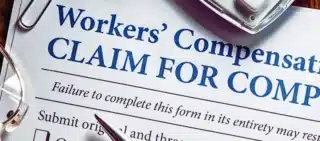
Common Reasons an Employer Won't Report Your Work Injury A total of 101,400 non-fatal work-related injuries and illnesses occurred in...


If your actions led to a workplace injury, you may be wondering, “Do you get workers’ comp if it’s your fault?” In a workers’ compensation case, fault is not assigned to any of the parties involved. Therefore, employees can usually receive compensation regardless of who caused the injury, whether it was their employer, a coworker, or someone else. However, there are some exceptions to this rule. If an employee engages in willful misconduct or gets injured while under the influence of drugs or alcohol, he or she may be ineligible to recover benefits.

Typically, the person who caused an injury will be required to pay compensation to the victim in an injury case. To receive compensation, the injured person must prove that someone else was responsible for the accident.
However, workers' compensation cases are different. Employees who are injured do not have to prove their employer's fault to receive compensation for their medical expenses and other costs. They only need to demonstrate that the injury or illness occurred on the job or as a direct result of the job.
Liability cases often rely on the concept of fault. Fault determines who is responsible for an accident or incident and enables the victim to receive compensation. In Illinois, the individual who is found to be at fault must bear the financial responsibility for any harm caused to others, typically through his or her insurance provider.
In civil law, fault is the attribution of responsibility or blame to a person for his or her actions or inaction, and is typically linked to liability for any harm or damage caused to people or property. Establishing fault usually requires proving that the person who caused the harm was either negligent or intentionally acted wrongfully.
Establishing fault is crucial in determining legal liability and awarding damages or compensation. It enables the victim to receive compensation for losses, such as medical expenses, lost income, and physical and emotional pain.
If a worker gets injured while on the job, he or she can receive workers' compensation benefits without having to prove fault or negligence on the employer's part. As long as the injury happened while the worker was fulfilling employment duties, the worker is eligible to receive benefits. This is a great advantage for workers, as they don't have to rely on someone else's fault to cover their medical expenses and lost wages. All they need to do is report the injury to their employer and file a workers’ compensation insurance claim to receive benefits.
The workers’ comp system is a form of compromise, where employees are covered for injuries sustained in the workplace in exchange for the ability to hold their employers directly liable. Workers' compensation is the exclusive remedy available to them.
In Illinois, to be eligible for workers' compensation benefits, an injured worker usually needs to prove the following:
The injury must have happened while the individual was performing work or undertaking actions required by the employer. This may seem straightforward if the injury happened at the actual workplace. However, injuries that occurred during other company business may be more complex to claim. It is advisable to seek the assistance of an experienced workers' compensation lawyer to navigate through the process.
It is crucial for a worker to establish an actual employee-employer relationship at the time of the accident to be eligible for compensation.
Additionally, the worker should prove that the injury was caused by the workplace accident, and not due to a pre-existing injury or some other incident.
There has to be some form of medical expenses incurred from the injury. Therefore, seeking medical treatment promptly is essential in getting compensation.
The injured worker must report the accident to the employer within the deadline specified in the Illinois Worker's Compensation Act.
Finally, the worker must demonstrate that his injury has impaired his functioning to be eligible for workers' compensation benefits. In some cases, the worker may still be able to work while receiving compensation.
Certain exceptions to the no-fault principle exist in Illinois. If any of these exceptions apply, an employee may hold the employer liable for injuries suffered while following an employer's instructions instead of claiming workers' compensation.
In Illinois, courts have outlined four specific exceptions where the no-fault principle will not apply:
In some cases, an employee's behavior may lead to a denial of his or her workers' compensation claim. Examples of such behavior include willful misconduct by the employee and working under the influence at the time of the injury.
Many U.S. states allow employers to defend against workers' compensation claims if an on-the-job accident was caused by an employee's willful misconduct. Willful misconduct can refer to reckless behavior, misconduct, failure to adhere to safety rules, or getting injured due to horseplay or carelessness. If an employer can prove that the employee was engaging in willful negligence, the employer may be able to argue against a workers’ comp claim.
Some indicators of willful misconduct include:
A claim may be denied if an employee deliberately hides his or her physical condition from the employer.
By emphasizing safety and warning employees about the risks of ignoring safety protocols, employers can prevent or minimize on-the-job injuries. Additionally, such measures help employers preserve their ability to assert the willful misconduct defense in the case of preventable injuries.
To emphasize safety policies, employers can conduct regular meetings to educate employees on rules and consequences. If an employee violates these safety policies and rules, it may be considered willful misconduct.
To prove that an injury is caused due to a safety violation or any other deliberate misconduct, witnesses play a crucial role. It is important to interview supervisors who can confirm the existence and implementation of safety policies. Did the employee attend a weekly safety meeting? Were the dangers of not following the safety policy explained to the employee? Did anyone hear the employee refuse to follow specific safety instructions?
Testimony from colleagues can be more valuable than that of supervisors, as they can confirm that the employee was aware of the safety policy and risks involved when they disregarded it recklessly. It is important to have credible peer testimony to support the enforcement of safety policies, rather than just supervisors and management who may have a self-interest in testifying.
According to the Workers' Compensation Act, if an employee's intoxication was the main cause of the accidental injury or if the employee was so intoxicated at the time of the incident that it constituted a departure from his or her work, he or she will not be entitled to compensation. Additionally, if the employee's blood alcohol level was above .08% or if he or she had illegal drugs in his or her system, there is a presumption that the intoxication was the main cause of the injury, although this presumption can be challenged.
Therefore, if an employer can prove that the employee was under the influence of drugs or alcohol when injured, the employer is not obligated to provide workers' compensation benefits under Illinois workers' compensation law.
If an employer suspects that an employee was under the influence of drugs or alcohol while on the job, there are two main ways to provide evidence: either have medical tests carried out immediately to determine whether there are any drugs or alcohol in the employee’s system, or collect witness accounts from the job site. It's not necessary for someone to have seen the employee taking drugs or drinking alcohol, though eyewitness accounts of erratic behavior, such as slurred speech or a glazed look in the employee’s eyes, can be valuable evidence.
An employer suspecting intoxication should consider the Occupational Safety and Health Administration (OSHA) guidelines and state statutes regarding intoxication. OSHA discourages employers from administering drug tests in a way that could discourage or penalize the reporting of workplace injuries. Blanket post-accident drug tests are not recommended. Drug testing should only be done when the nature of the accident or injury is likely to have been caused by the employee's use of drugs or alcohol. For example, if two employees collide with a forklift, it may be appropriate to drug test both drivers, but a bee sting would not warrant a drug test.
Besides drug testing, employers should also document any other evidence that suggests intoxication. Some employers use checklists to document the reasons for suspecting drug use and for administering a drug or alcohol test. The checklist might note slurred speech, glassy eyes, or any odors that suggest substance abuse. In the process of documenting these observations, an employer might speak with the employee's supervisor and coworkers to get information about the employee's history of substance abuse, among other things.
Workers' compensation benefits are available to employees who suffer from work-related illnesses or injuries, regardless of who is at fault in the incident — be it the employee, employer, coworker, customer, or any other third party involved. However, in cases where willful misconduct applies, the validity of a claim may be questioned and benefits may be denied.
In a workers' compensation claim, the amount received by the claimant is not affected by his or her own carelessness or the employer's fault. Workers' compensation operates on a no-fault policy, which means that regardless of who caused the accident, the employee will still be covered.
When filing a claim, proving the employer's negligence does not have an impact on the type or amount of benefits received. Workers' compensation benefits are set by statute. The Worker’s Compensation Commission does not consider negligence when deciding the benefits. Therefore, when filing a claim, an attorney will not focus on the employer's failure to provide a safe workplace unless the employer alleges that the employee's willful misconduct caused the injury.
However, if the injury is the result of an employee's intoxication from drugs or alcohol, or if he or she intentionally engaged in misconduct or gross negligence, he or she will lose the right to workers' compensation.
It is often a good idea to seek the advice of an attorney before submitting a workers' compensation claim. If you are concerned about how much it costs to hire a workers’ comp attorney, you can address this with your attorney before beginning the process.
If you choose to proceed, there are several factors to consider, ensuring that your workers' comp claim is properly filed. Your workers' compensation lawyer can inform you whether your employer has a negligence policy and can also assist you in determining whether that policy is valid.
A lawyer will understand the workers' compensation investigations and what they look for. In cases where you may have engaged in willful misconduct, or put your claim in peril, it can be difficult to know what to do. However, with the help of an experienced injury attorney, these concerns, and situations can be addressed. Your attorney can inform you of your unique circumstances, and provide the best possible chance of success in making a claim.

Common Reasons an Employer Won't Report Your Work Injury A total of 101,400 non-fatal work-related injuries and illnesses occurred in...

At Strong Law Offices, we have a team of workers' compensation lawyers who understand the financial setbacks and physical limitations...

Common Equipment Involved in Run-Over Accidents Illinois job sites, from construction zones to industrial plants, depend on machinery to stay...